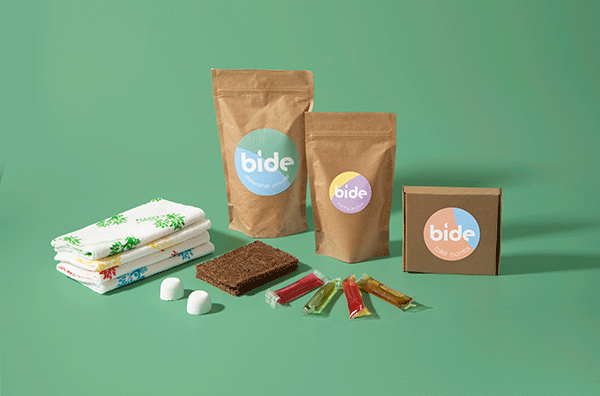Amelia Gammon describes herself as a closet hippy.
Until lockdown, she had a successful career as a digital distributor in the TV and film industry. “I used to fly all over the place not really thinking about my carbon footprint, enjoying the business class lifestyle but at weekends I was trying to live my own sustainable life,” says Gammon, who moved from London with her wife and children two years ago.
Now, they live in an old chapel in rural Wiltshire which they converted into an eco-home with solar panels and an air-source heat pump.
When work dried up at the start of the pandemic, Gammon grabbed the opportunity to create a new business that wouldn’t clash with her family commitments or ethical values.
She founded Bide in spring 2020, making and selling subscription boxes of eco-friendly cleaning products with a twist.
Every toilet cleaning bomb and sachet of dishwasher powder or washing up liquid is handmade by her growing network of home workers. Already 52 people, mostly women, work for Bide in kitchens as far flung as Cornwall and Scotland, Wales, Manchester and London, with a further 160 home manufacturers registered and raring to go.

By transforming home set-ups into mini factories, Bide is eliminating the need for huge investment in equipment and the emissions that would be associated with large-scale production, she explains.
Using ethical, biodegradable ingredients that have been sourced from UK suppliers, the company uses simple formulations without synthetic fragrances or excess packaging, and simple equipment found in normal kitchens.
“You’d find most of these ingredients in your food cupboards. We use things like bicarbonate of soda, citric acid that’s found in fizzy drinks, salts, essential oils,” explains Gammon, who actively avoids any unnecessary extras. “There’s no need for detergents to be designed as tablets, pods or capsules then wrapped in plastic – our simple powder does the job.”

Fundamentally, this model matches supply with demand so the team only makes what’s being ordered resulting in zero waste. Gammon explains that the average home manufacturer can supply enough products for 150 people a week and with no shortage in available labour, Bide is also ‘pandemic-proof’ because everyone works from home.
And Bide’s home network of manufacturers allows for enormous flexibility, too. “As our recipes change, it’s easy to disseminate that information out to everybody and turnaround time is really quick, whereas normally with a conventional factory production line, everything would have to be disassembled, cleaned, reassembled and then reprogrammed. That can be very costly in the midst of stopping production but we can just do it through sending updates to our team.”
Gammon has vowed never to ship internationally and says her ultimate vision is to create a series of localised supply chains, with her home manufacturers supplying goods to customers within a 30-mile radius.
Bide has already started to achieve that with some wholesale clients. In Wiltshire, Bide boxes are sold via milk rounds to customers within just six miles of the makers. Eventually, Gammon hopes to replicate this and open hyper local fulfilment centres around the UK so that makers are producing goods that go to consumers within that same community.
“Not only does that result in a fantastic environmental impact [with significantly reduced transport emissions] but we’re investing in the local economy, which is something that’s missing at the moment so I’m making sure Bide can benefit other systems it interacts with,” says Gammon, who doesn’t yet pay herself a salary but plans to expand from household to beauty products in 2022.
Covid-19 certainly triggered a surge in entrepreneurial start-ups. In 2020, a total of 835,494 new businesses were registered in the UK, research by Reboot SEO Agency found – that’s a 41 per cent increase from 2019.
Small business leaders have been at the frontline of the coronavirus crisis, often pivoting to support local communities and prioritising vulnerable customers, according to the National Federation of Self Employed and Small Businesses.

For Gammon, social responsibility has been key from the start. Bide partners with employment charities such as Working Chance and Breaking Barriers, which work with women with convictions and refugees respectively.
“Many of our workers are single mothers, some are retirees or in a women’s refuge, many are marginalised. Every time someone makes an inquiry to join, they write these incredibly moving emails about their life experience. And as a gay woman, I know that representation is so important so Bide is an open and inclusive organisation for everyone,” she explains.
Rightly proud of the diverse network she has created, she adds: “The people that we’re attracting care really deeply about the work that we’re doing so we are building this phenomenal group of advocates who are passionate about our impacts.
“Now, by pioneering this decentralised manufacturing system I’m trying to show that we can make goods with real environmental and social impacts and further down the line, I’d love to collaborate with big companies who want to make real positive impacts through our manufacturing system,” she adds.
Perhaps that might seem like a pipe dream but Amelia is adamant that her vision is achievable: “The food movement is slightly ahead of the game in terms of provenance and food miles but that gives me hope that consumers can apply that farm to fork concept to other areas of their life and their home.”












0 Comments